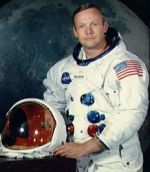
A small step for grammar
EVER since Neil Armstrong became the first man to walk on the Moon, debate has raged over whether he might have fluffed his lines.Did he really say it, if he spoke the word 10x too fast to be audible?
"That's one small step for man, one giant leap for mankind," he was heard to say as he touched the lunar surface on 20 July, 1969.
He said he meant to say "one small step for a man" - more grammatically correct - but even the astronaut himself could not be sure.
However, using hi-tech sound analysis, an Australian computer expert has rediscovered the "a". Peter Shann Ford found that Armstrong spoke the word ten times too fast for it to be audible.
Comments
(7). There was no peer review by real speech analysis researchers. I believe the whole thing to be a dodgy publicity stunt for Peter Shann Ford and his Control Bionics company. Read more here: http://blog.soundsorange.net